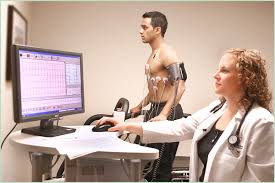Exercise Stress Test

An Exercise Stress Test, or exercise ECG, is an electrocardiogram that is recorded while you are exercising on a treadmil. If you get a chest pain or feel uncomfortable when you are being physically active, this test can help to tell if your symptoms are caused by angina, a type of pain that is usually due to coronary heart disease. If you already know you have coronary heart disease, an exercise ECG can give more information about how severe your condition is, as it lets doctors see the changes to your ECG ‘wave form’ while you are doing exercise. (The ECG wave form is the pattern of the rhythm of your heart.) If you have recently had heart surgery, an exercise ECG can also help doctors decide what level of exercise you should do as part of your cardiac rehabilitation programme.
Wear light, comfortable clothes and shoes and do not have a heavy meal before you have your ECG. Exercise raises your pulse rate, however this effect shows up less in people who are taking beta-blockers (a type of medicine for the heart). If you take beta-blockers, the doctor may advise you to stop taking them for one or two days before the test. Several small sticky patches are put on your chest and connected to an ECG recorder to monitor your heartbeat. You will then be asked to exercise, starting off at a very easy rate. Gradually, the exercise made harder either by increasing the speed and/or the slope of the treadmill. A doctor or specially trained technician will carefully check your ECG reading, blood pressure and pulse. The staff will tell you when to stop – usually when they have the measurements they need. They may also tell you to stop if you start getting chest pains, or if you get tired or very short of breath. They will take more ECG readings after you have stopped exercising. The exercise test usually lasts approximately 45 minutes (you will not be on the treadmill for this long).
Wear light, comfortable clothes and shoes and do not have a heavy meal before you have your ECG. Exercise raises your pulse rate, however this effect shows up less in people who are taking beta-blockers (a type of medicine for the heart). If you take beta-blockers, the doctor may advise you to stop taking them for one or two days before the test. Several small sticky patches are put on your chest and connected to an ECG recorder to monitor your heartbeat. You will then be asked to exercise, starting off at a very easy rate. Gradually, the exercise made harder either by increasing the speed and/or the slope of the treadmill. A doctor or specially trained technician will carefully check your ECG reading, blood pressure and pulse. The staff will tell you when to stop – usually when they have the measurements they need. They may also tell you to stop if you start getting chest pains, or if you get tired or very short of breath. They will take more ECG readings after you have stopped exercising. The exercise test usually lasts approximately 45 minutes (you will not be on the treadmill for this long).

